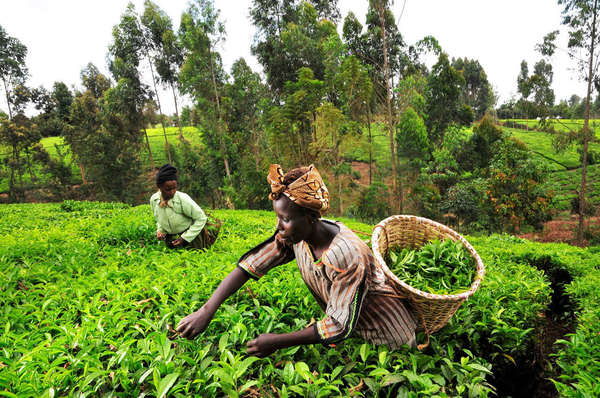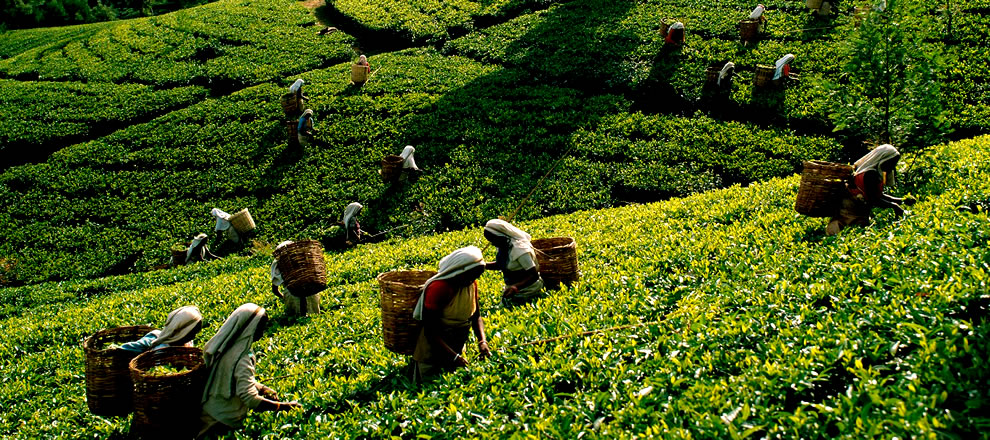Kenya's largest tea producing region saw a 14 percent drop in production from last year.
Kenya Tea Development Authority (Kenya Tea Development Agency Ltd.) Small farmers shipped 1.25 billion kilograms (2.76 billion pounds) of green leaves to factories in the 12 months to June, compared with a record 1.45 billion kilograms last year. The average price at the Mombasa tea auction fell 8% to $2.18 per kilogram during that period, the agency said in an email on Sunday. "however, the relatively favourable exchange rate of Kenyan shillings against the dollar has helped boost tea sales, which are usually denominated in dollars," the statement said. The East African country is the world's largest exporter of black tea and one of the country's main sources of foreign exchange. Its weekly tea auctions get tea from neighboring countries. Kenya's seven-month tea export revenue fell 2.2 per cent year-on-year to $706 million, a continuation of the downward trend since 2018, as supply outstripped demand and tea processors carried forward unsold inventory. The COVID-19 epidemic not only poses challenges to global shipping and logistics, but also reduces demand for tea in major consumer countries and disrupts business, the agency said. "to mitigate the risk of concentration in the Kenyan black tea market and over-reliance on four major markets that account for 70 per cent of our tea exports, ktda-managed factories have begun to produce orthodox tea that is popular around the world and can get better prices," it said. This week, more than 600,000 farmers across the country will go to the bank with a smile.

Kenya Tea Development Authority Management Services Co., Ltd. announced that it had paid 21.6 billion shillings in tea bonuses to farmers in the financial year ending June 30, 2021. The South Korean Trade Development Agency said in a statement Wednesday that farmers are expected to receive the payment by the end of the week. This is the second time that the agency has made such a payment after a series of meetings held by the director of the tea factory between September 20 and October 1, 2021. David Ichoho, president of KTDA, said: "in order to transfer the 1 billion sho fertilizer subsidy provided by the government directly to farmers, every 50 kg fertilizer bag will reflect 600 sho." Ichoho calls on farmers to reinvest their income in improving the quality of agricultural production to make their business more sustainable. However, the S $21 billion bonus is one of the lowest in recent years. Last month, Ichoho admitted that the profit margin was low, saying: "the payment rate profit margin will be the same or slightly lower than the bonus that farmers received last year. However, we are optimistic that with the introduction of the floor price in July this year, wages will be higher next year. " The sales of each tea factory, the quality of tea, the auction price and the management mode of the tea factory all help to determine the distribution of bonuses. Individual factories consider tea sales income, while other income includes interest on investment and dividends from KTDA holding companies. Tea farmers send their products to a 54-kilogram tda-managed factory.
Important Notice :
前街咖啡 FrontStreet Coffee has moved to new addredd:
FrontStreet Coffee Address: 315,Donghua East Road,GuangZhou
Tel:020 38364473
- Prev

Coffee rookie enthusiasts how to learn coffee knowledge, which direction begins to learn.
As a coffee rookie, if you want to understand coffee, you must first study the changes in its flavor, which is what coffee lovers pay close attention to. Coffee lovers can first follow the point, line, noodle way to learn coffee knowledge, you can start from the point of interest in the most common contact with the point to understand. Such as brewing, how is a good cup of coffee?
- Next

Tea plantations in Sri Lanka are facing insect pests, and the Sri Lankan Institute of Tea use allows tea farmers to use herbicides and pesticides.
An industry official said Sri Lanka's tea production could fall sharply due to pests and fungal outbreaks caused by weeds, pesticide bans and fertilizer problems. RoshanRajadurai, a spokesman for the growers' Association, which represents the farm manager, said in a statement that there were no herbicides, soil.
Related
- Beginners will see the "Coffee pull flower" guide!
- What is the difference between ice blog purified milk and ordinary milk coffee?
- Why is the Philippines the largest producer of crops in Liberia?
- For coffee extraction, should the fine powder be retained?
- How does extracted espresso fill pressed powder? How much strength does it take to press the powder?
- How to make jasmine cold extract coffee? Is the jasmine + latte good?
- Will this little toy really make the coffee taste better? How does Lily Drip affect coffee extraction?
- Will the action of slapping the filter cup also affect coffee extraction?
- What's the difference between powder-to-water ratio and powder-to-liquid ratio?
- What is the Ethiopian local species? What does it have to do with Heirloom native species?

